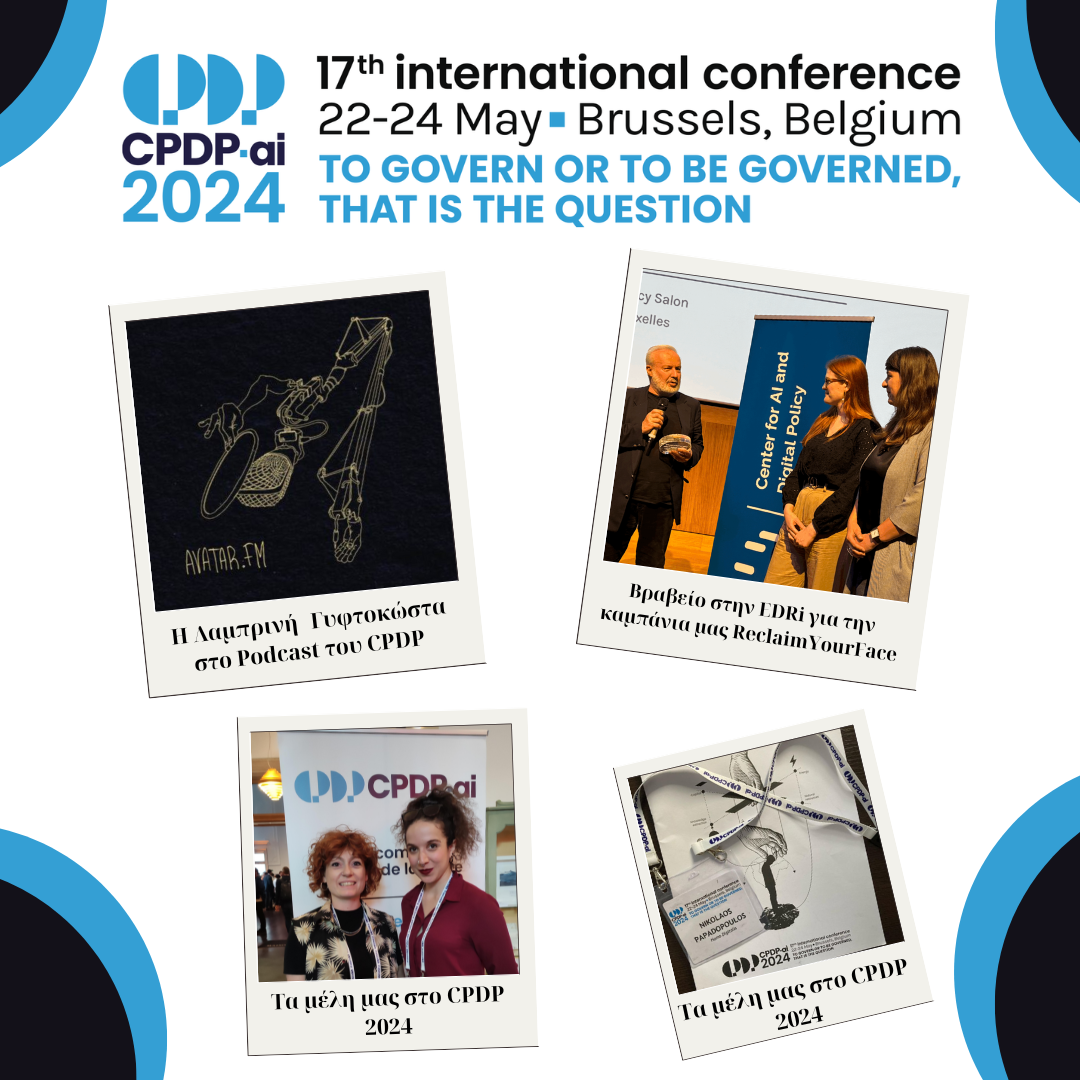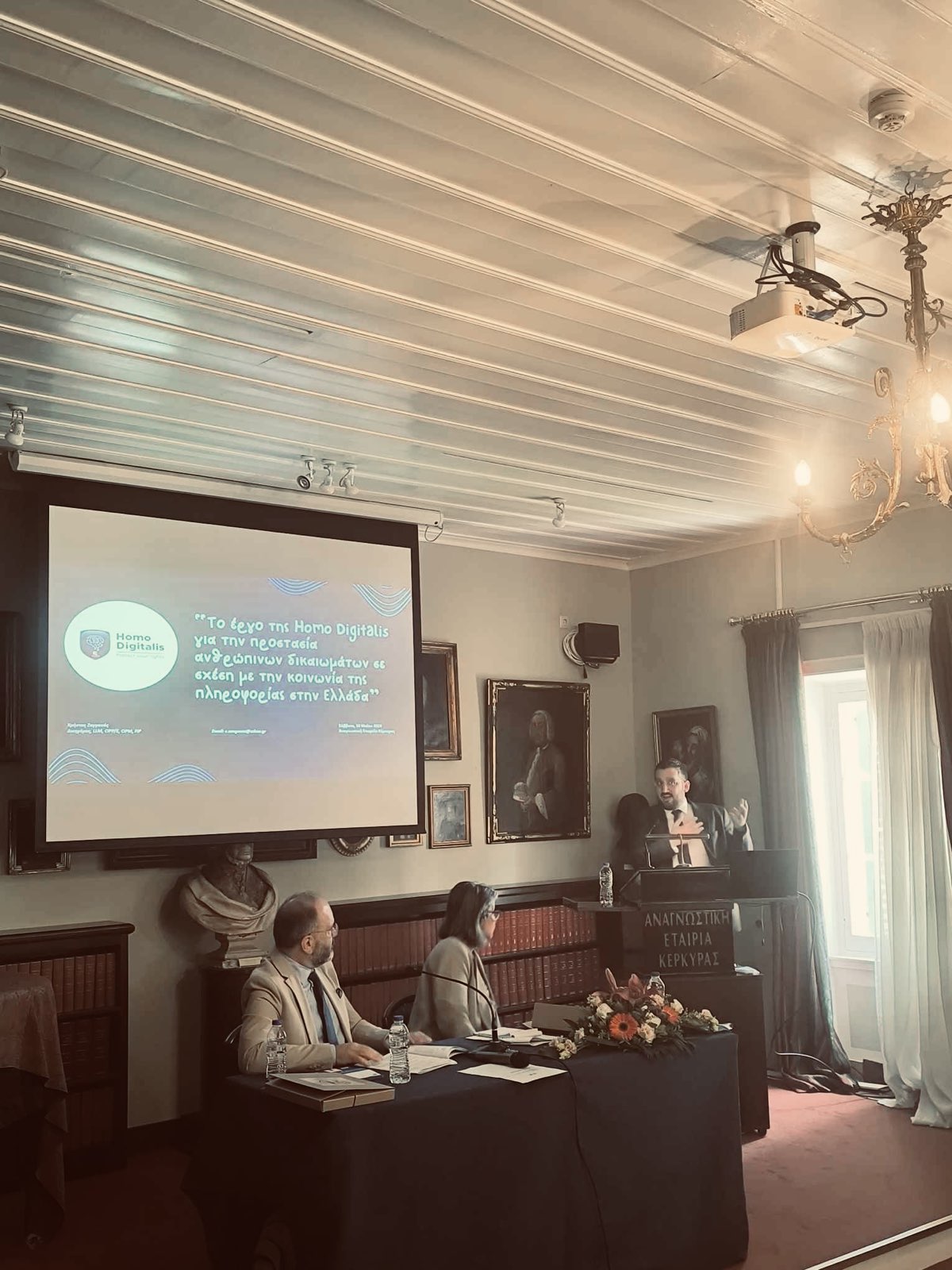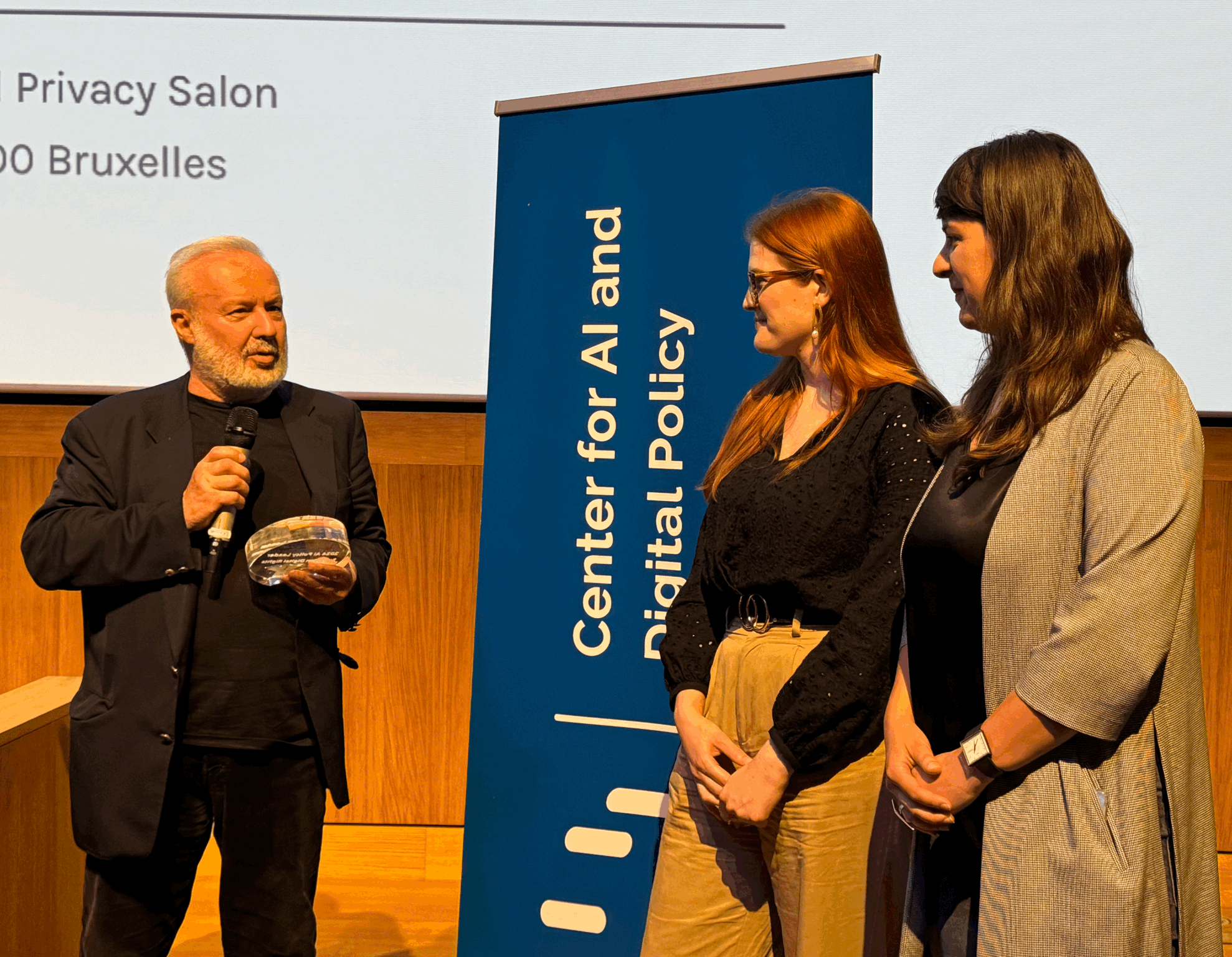We give a lecture on AI ACT at company bora
Tomorrow, June 20, Homo Digitalis will give a talk-seminar on AI Act before the workforce and partners of the company bora.
Specifically, Homo Digitalis’ AI & Human Rights Manager, Lamprini Gyftokosta, in a 1-hour web presentation in English, will take a deep dive into the important provisions of the new legislation and discuss relevant compliance challenges with the audience!
Many thanks to bora for the kind invitation to host this seminar, and especially to Anastasios Arampatzis, Joe Pettit & David Turner!
You can learn more about bora here.
If you would also like to invite Homo Digitalis to provide a relevant seminar to your employees, you can express your interest at info@homodigitalis.gr
Homo Digitalis speaks at the 2nd Colour of Surveillance Conference
Homo Digitalis has the great honour and pleasure to speak at the 2nd European Colour of Surveillance Conference “Liberation Practices in times of Fascism”, which this time is being held on 26 & 27 June in Berlin by the organisations Equinox Initiative for Racial Justice, International Women* Space and Weaving Liberation!
Specifically, Homo Digitalis’ Director of Human Rights & AI, Lamprini Gyftokosta, will give a speech in the framework of the Workshop “Blue: the colour of surveillance In Greece: lessons from challenging Migration Tech” during the second day of the conference!
We would like to thank the organizers for the kind invitation and hospitality!
You can learn more about the conference programme here.
Translated with DeepL.com (free version)
Homo Digitalis' participation in CPDP 2024 was a great success
For another year, and consistently since 2019, Homo Digitalis was present at the internationally renowned Computers, Privacy & Data Protection (CPDP) conference in Brussels!
We are honored that the organizers chose us to participate in the conference podcast series, with our Director for AI & Human Rights, Lamprini Gyftokosta, analyzing our pending cases before the Data Protection Authority in Greece, and our significant successes so far!
Also, another very nice moments of ours at the event, is EDRi’s award from the Center for AI and Digital Policy (CAIDP) “AI Policy Leader in Civil Society” regarding our joint campaign ReclaimYourFace, of which Homo Digitalis is a co-founding member!
Of course, it is always unique for us to see our members actively participating in the conference and have a dynamic presence in discussions, panels and other events both with their Homo Digitalis hat and that of their professional capacity Thank you very much for proudly representing Homo Digitalis at this conference every year!!!
Homo Digitalis' participation in the Digital World Summit Greece was a great success
Homo Digitalis had the great honor and pleasure to be present with double representation at the Digital World Summit Greece, today Tuesday, May 28th at the National Hellenic Research Foundation!
Specifically, our Vice President and Partner at Digital Law Experts (DLE), Stefanos Vitoratos, participated as a moderator in the 1st panel of the conference, on the topic “#AI: The intersection between regulation and innovation”, in a fascinating discussion with speakers such as Dimitris Gerogiannis (President AI Catalyst), Lilian Mitrou (Professor, Department of Information & Communication Systems Engineering, University of the Aegean), Charalambos Tsekeris (President of the National Bioethics & Technology Ethics Committee), Yannis Mastrogeorgiou (Special Secretary for Long Term Planning, Presidency of the Greek Government) and Fotis Draganidis (Director of Technology at Microsoft Hellas).
Our Director for Human Rights & Artificial Intelligence, Lamprini Gyftokosta, was a speaker at the 2nd panel of the Digital World Summit Greece 2024, on “Cybersecurity, Citizen Security and Artificial Intelligence”! The panel was moderated by Konstantinos Anagnostopoulos (Co-founder & Director, Athens Legal Tech), while Natalia Soulia (Senior Associate | Privacy, Data Protection & Cybersecurity, KG Law FIrm) was also present as a speaker, Thomas Dobridis (Head of the General Directorate of Cybersecurity, Ministry of Digital Governance), Antonis Broumas (Head of Law and Technology, EY Platis-Anastasiades) and Stella Tsitsoula (Founder, RED. comm, Co-Founder | Women4Cyber GR | Founder Hellenic Cybersecurity Institute)!
We would like to thank the organizers for their kind invitation, as every year, to this important conference.
We successfully presented our actions at InfoRights 2024 in Corfu
Homo Digitalis has the great pleasure to participate in the Third Interdisciplinary Conference Info Rights , organized by the Reading Society of Corfu on 17 & 18 May 2024 entitled “Human Rights in the Information Age: Benchmarks of History, Law, Ethics and Culture”.
Specifically, on Saturday 18 May, our member Christos Zanganas represented Homo Digitalis presenting our important actions in the field of Digital Rights in our three pillars of interest, Awareness, Advocacy and Strategic Legal Actions!
We would like to thank the organizers for the kind invitation!
We took an award at CPDP for the Reclaim Your Face campaign
On Tuesday 21 May at the Computers, Privacy & Data Protection (CPDP) conference in Brussels the first ever “Europe AI Policy Leader Awards” by the Center for AI and Digital Policy (CAIDP) took place!!
There the European Digital Rights (EDRi) network, of which Homo Digitalis is the only member in Greece, received the “AI Policy Leader in Civil Society” award for the Reclaim Your Face campaign which was a leader in setting limits on the use of remote biometric identification in the EU AI Act!!!
It is a great honour for Homo Digitalis to be a co-founding member of this campaign, and this award fills all campaign members from the EDRi network and other allies with enthusiasm for all that we can achieve when we act strategically under a common goal!
Thank you CAIDP for this important recognition!
Homo Digitalis with double representation at Digital World Summit Greece
Homo Digitalis has the great honor and pleasure to participate with double representation at the Digital World Summit Greece, on Tuesday 28 May at the National Hellenic Research Foundation!
Specifically, our Vice President and Partner at Digital Law Experts (DLE), Stefanos Vitoratos, will participate as a moderator in the 1st panel of the conference, on the topic “AI: The intersection between regulation and innovation”, in a fascinating panel discussion featuring Dimitris Gerogiannis (President AI Catalyst), Lillian Mitrou (Professor, Department of Information & Communication Systems Engineering, University of the Aegean), Charalambos Tsekeris (President of the National Bioethics & Technology Ethics Committee), Yannis Mastrogeorgiou (Special Secretary of Long Term Planning, Presidency of the Greek Government) and Fotis Draganidis (Director of Technology at Microsoft Hellas).
Our Director for Human Rights & Artificial Intelligence, Lambrini Gyftokosta, will participate as a speaker in the 2nd panel of the Digital World Summit Greece 2024, on the topic “Cybersecurity, Citizen Security and Artificial Intelligence”! This very interesting panel will be moderated by Konstantinos Anagnostopoulos (Co-founder & Director, Athens Legal Tech), while Natalia Soulia (Senior Associate | Privacy, Data Protection & Cybersecurity, KG Law FIrm), Thomas Dombridis (Head of the General Directorate of Cybersecurity of the Ministry of Digital Governance), Antonis Broumas (Head of the Law Department of the Ministry of Digital Governance), Antonis Broumas (Head of the Law Department of the Ministry of Digital Governance), and the Head of the Law Department of the Ministry of Justice of the Republic of Greece) will also be present as speakers.
You can register and read more about the conference and its programme here.
We participate in InfoRights 2024 in Corfu
Homo Digitalis has the great pleasure to participate in the Third Interdisciplinary Conference, organized by the Corfu Reading Society on 17 & 18 May 2024 entitled “Human Rights in the Information Age: Benchmarks of History, Law, Ethics and Culture”.
Our member Christos Zanganas will represent Homo Digitalis at the Conference, and on Saturday 18 at 12:00 he will present Homo Digitalis’ work for the protection of human rights in relation to the information society in Greece!
We would like to thank the organizers for the very honorable invitation!
You can register for free to attend the conference in person or read more about it here.
The focus of the interdisciplinary themes of the conference is human rights in relation to information in terms of history, regulation (law and ethics) and culture. It is co-organised by the Cultural and Historical Heritage Documentation Laboratory of TABM, the IHRC Research Group of TABM, and the Ionian University Library and Information Centre with the collaboration of the UNESCO Chair on Threats to Cultural Heritage and Heritage-related Activities of the Ionian University, as well as the Corfu Bar Association and the Ionian University Museum Collections.
We bring the "Misinformation" and "What The Future Wants" editions of the international exhibition "The Glass Room" to ADAF 2024!
The “Misinformation” and “What The Future Wants” editions of Tactical Tech’s international exhibition “The Glass Room” will be at the Athens Digital Arts Festival 2024 (ADAF2024)!!
In collaboration with Tactical Tech, the exhibition is brought to Greece by Homo Digitalis, Digital Detox Experience and Open Lab Athens, with the Homo Digitalis team and specifically our members Sophia Antonopoulou, Ariana Rapti and Alkmini Gianni, organising the two exhibitions for ADAF 2024!
ADAF 2024 will take place from 16 to 26 May at the Former Santarosa Courts (48 Stadiou & Arsaki). “The Glass Room: Misinformation Edition” will be available to the audience throughout the festival, while “The Glass Room: What the Future Wants Edition” will be presented in the form of a workshop on Saturday 18/5 at 14.00 by our members Sophia Antonopoulou, Ariana Rapti and Alkmini Gianni.
You can buy tickets for ADAF 2024 and read the full festival programme here.
Many thanks to our three members for their time, energy and dedication in organizing these exhibitions, as well as to ADAF for hosting us!
The Glass Room exhibition has travelled to 61 countries around the world, counting 471 award-winning events and more than 350,000 visitors worldwide. In the past, Homo Digitalis, Digital Detox Experience and Open Lab Athens have presented the exhibitions at the National Library of Greece in Athens and at JOIST Innovation Park in Larissa.








